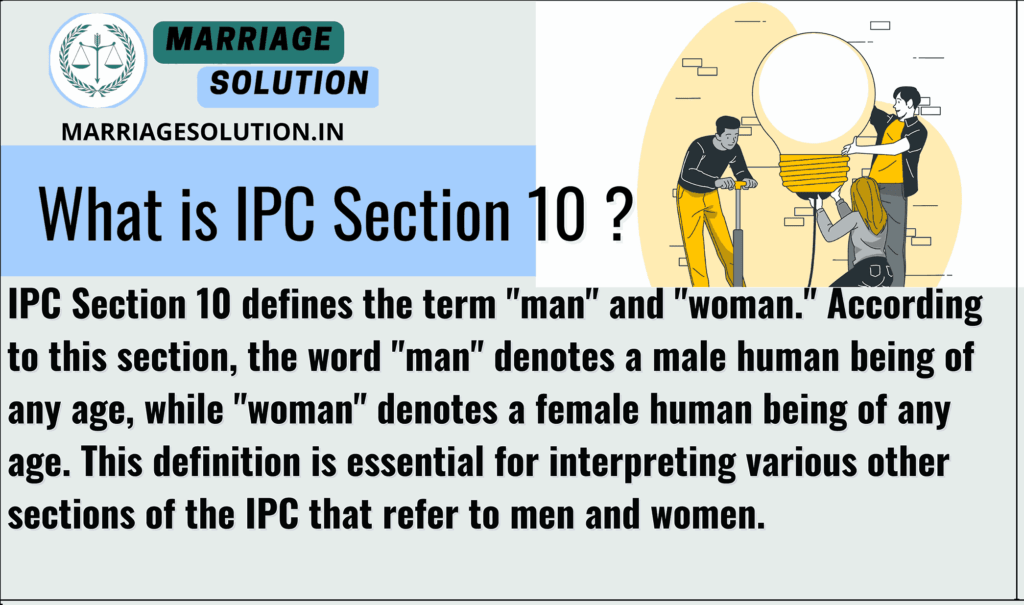Introduction of IPC Section 10
The Indian Penal Code (IPC) is a comprehensive legal document that covers all substantive aspects of criminal law in India. Among its many sections, IPC Section 10 is crucial as it defines specific terms used throughout the code, providing clarity and consistency in the application of the law.

What is IPC Section 10 ?
IPC Section 10 defines the term “man” and “woman.” According to this section, the word “man” denotes a male human being of any age, while “woman” denotes a female human being of any age. This definition is essential for interpreting various other sections of the IPC that refer to men and women.
IPC Section 10 Overview
IPC Section 10 defines the terms “man” and “woman” within the Indian Penal Code. According to this section, “man” refers to a male human being of any age, and “woman” refers to a female human being of any age. This clear definition helps in interpreting various sections of the IPC that involve gender-specific references.
Key-Points
- Clarity in Terminology: It ensures that the terms “man” and “woman” are clearly defined for legal purposes.
- Gender Identification: It helps in identifying individuals involved in legal cases accurately.
- Application in Other Sections: The definitions provided here are applied throughout the IPC to avoid confusion.
- Inclusive of All Ages: It specifies that these terms include individuals of all ages.
- Legal Consistency: It maintains consistency in the legal language used across different sections.
- Foundation for Other Laws: Other laws and sections referring to gender use this definition as a foundation.
- Judicial Interpretation: Courts rely on this section to interpret gender-related aspects of cases.
- Protection Under Law: Ensures that all ages are protected under relevant sections of the IPC.
- Basis for Legal Arguments: Legal arguments and defenses often start with the definitions provided here.
- Fundamental Understanding: Provides a fundamental understanding for law enforcement and judicial processes.
IPC 10 Punishment
IPC Section 10 itself does not prescribe any punishment since it is a definitional section. Its purpose is to provide clear definitions to be used in interpreting and applying other sections of the IPC. Therefore, no specific penalties or punishments are associated with this section alone.
10 IPC bailable or not ?
Since IPC Section 10 is purely definitional and does not pertain to any criminal conduct or offenses, the concept of bail does not apply. It does not describe any crime or punishment, hence there is no question of it being bailable or non-bailable.
Section 10 IPC in short information
| Aspect | Definition | Offence | Punishment | Bailable |
|---|---|---|---|---|
| Definition | Defines “man” as any male human being and “woman” as any female human being, of any age. | None | None (Definitional section, no punishment prescribed) | Not applicable (No offense) |
IPC Section 10 FAQs
What does IPC Section 10 define?
IPC Section 10 defines the terms “man” and “woman” for legal purposes, ensuring clarity in the application of the law.
Why is IPC Section 10 important?
This section is important because it provides a clear definition of gender terms used throughout the IPC, ensuring consistency and avoiding ambiguity in legal proceedings.
Does IPC Section 10 specify any punishments?
No, IPC Section 10 does not specify any punishments. It is a definitional section meant to provide clarity on terms used in the IPC.
If you need support with court proceedings or any other legal matters, don’t hesitate to reach out for assistance.
Court or any other marriage-related issues, our https://marriagesolution.in/lawyer-help-1/ website may prove helpful. By completing our enquiry form and submitting it online, we can provide customized guidance to navigate through the process effectively. Don’t hesitate to contact us for personalized solutions; we are here to assist you whenever necessary!
